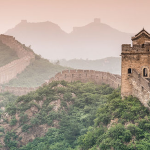Released in China in mid-December 2016, the ‘Great Wall’ film starring Matt Damon in its lead role, discovers the mystery behind one of the greatest wonders of the world – the Great Wall of China.
Wave after wave of magical beasts attack the massive structure, and to defend it, Damon’s character goes on a journey of self-discovery, joining a huge army of elite warriors to do the unthinkable and stop the seemingly unstoppable force.
A Voyage of Self-Discovery
In 2000, there was an initiative to choose 7 new wonders of the world from a selection of 200 monuments. Of the winners, the Great Wall of China was one of them.
The ‘new’ list differs from the ancient wonders of the world. The classic wonders include the Great Pyramid at Giza and the Hanging Gardens of Babylon.
Other sectors also have their own seven wonders, such as the 7 Engineering Wonders of the World among which the Channel Tunnel is included.
Take time to research the wonders of the world and you will begin a voyage of discovery, unearth stories and conflicts that gave rise to some of the most amazing monuments the world has ever seen.
What is even more astounding is that many of these monuments, such as staircase pyramids built by the Mayan peoples, were completed without the aid of the wheel or machinery. How did the Mayan people move such heavy blocks of stone from ground level to so high above? How did the Egyptians complete the same feat?
Finding the answers to some of these questions will lead you on a journey of self-discovery. They will lead to interesting places, as well as firing your imagination.
And this is why learning is so important. From a new hobby to new skills, learning at any time of life, no matter how young or old the student, is a voyage of self-discovery that is priceless.
Why study history courses online?
For many, history is a hobby, a chance to look back and enjoy stories of the past. For others, it is a field of important academic study.
- Stories of the past – discover the stories behind some of the most infamous incidents from the past, from the did she/didn’t she debate of Emily Davidson and King’s horse as part of the suffragette history, to the complex social, political and economic background to American slavery.
- Learn from mistakes of the past – the captain of the Titanic used all the information and knowledge given to him against him. Now how can we change that to prevent future disasters?
- Meet great people and peoples – the culture of peoples long gone leave behind traces of their society of which we have little understanding. The mystery of Stonehenge, for example, has never been solved – but why is it there?
- A magnifying glass for the future – after World War II, the leaders of the world said it should never be allowed to happen again. The mass extermination of Jews in Nazi Germany, they said, will never be repeated. And yet, mass slaughter of the Tutsis in Rwanda in the early 1990s bore unnerving similarities, as have other genocides.
- Wisdom and knowledge – these two go hand in hand. With the study of online history courses, you will develop and soak up so much interesting information that you will wonder how your brain will cope with it all.
- More tolerant – the world is full of interesting peoples and cultures. But as we have seen in recent tumultuous years, when these cultures and societies meet, the lack of tolerance and understanding leads to conflict and war. By understanding cultures and tradition – even if you disagree with them – you become more willing to embrace difference.
- Flexible online study – history is often seen as a tough subject. It is an academic form of study, with lots of reading and long essays to write. This may sound daunting but, on the other hand, you will become far more organised in your thoughts and your writing abilities. Online study is flexible: you study when you want, at a time and a pace that suits you.
To understand our past, is to understand our future, the how and why things changed. But also, in the uncertain times in which we live, history can also help us understand why political regimes create something like the Great Wall of China. In a hundred years’ time, will history courses online be talking about the Great Wall of Mexico?








